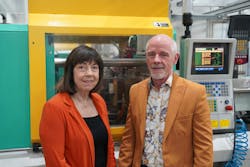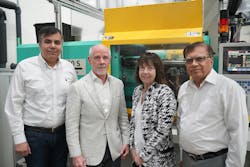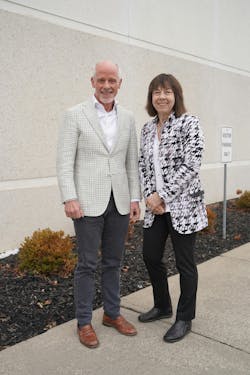Silcotech's leaders linked professionally and personally: In Other Words
By Bruce Geiselman
Michael Maloney and Isolde Boettger met at a plastics trade show in 1998 and immediately hit it off.
In fact, in no time at all, they formed both a personal and a professional relationship. The now-married couple later that year formed Silcotech North America Inc., a liquid silicone rubber (LSR) molding facility in Bolton, Ontario.
Silcotech North America on Oct. 20, 2023, celebrated its 25th year in business. The company started with just two employees — Maloney and Boettger — but it has grown to more than 100 employees working out of a highly automated, state-of-the-art facility. Silcotech also has a facility in India, Silcotech Bonny Products Pvt Ltd.
When Silcotech North America launched in 1998, brothers Udo Lange and Holger Lange of Silcotech AG in Switzerland were shareholders. Udo was the founder of Silcotech AG and a friend of Maloney’s. Maloney and Boettger bought out their partners’ shares in 2010 and began operating independently.
Maloney and Boettger recently talked with Bruce Geiselman, senior staff reporter for Plastics Machinery & Manufacturing, about their personal and professional partnership and some of the highlights of their careers.
How did you two meet and decide to go into business together?
Boettger: We met at a plastics show in Long Beach, Calif., at the beginning of 1998. We both were working in the plastics industry.
We both were going through a divorce at the time. We continued to meet over that year, and Michael had a friend in Switzerland [Udo Lange] who was the founder of Silcotech, which was founded in 1984 in Switzerland.
We [Michael and Isolde] decided we would like to stay together and began discussing our future visions. Michael was in contact with his friend [Udo], who wanted to work with Michael on setting up something in North America.
Maloney: I had spent 17 years by that point in the industry and the injection molding machine space. We decided to do something together, and injection molding in general suited me quite well.
I said, Izzy, I have this really good friend in Switzerland. We have an opportunity. We could start a liquid silicone molding company. The next thing I know, Izzy is on an airplane flying to Germany and driving to Switzerland to meet my friend. They liked each other very much, and we began.
We went to the K Show in Germany in October 1998 and ordered our first two molding machines in November 1998.
Boettger: It was a very short period of time from when we met to when we started a business and decided to stay together. It’s very unusual. We rented a couple of units [of industrial space] here in Bolton in January 1999 and operation then started in May 1999.
You remained partners with Udo and Holger Lange until 2010 when Trelleborg bought Silcotech AG. At that point, you struck out on your own, is that correct?
Maloney: We disbanded because Isolde and I decided that we did not want to sell to a large international company. We didn’t want to be part of an investment portfolio, and we weren’t sure as to how that would develop.
Boettger: The timing definitely was not right for us. It was in 2010, and our company still wanted to grow and develop. We were not into selling the company at that point.
Maloney: We disbanded the group. We acquired the balance of the shares that were held by the two Lange brothers, Udo and Holger, and became independent. We took the North American and the Indian operation. We went off on our trajectory to continue to develop technology in the space. Our initial mission was to be the most technically advanced molder of liquid silicone rubber in the world, and that continues to drive us.
What role does each of you play in the company?
Maloney: I’m responsible for anything technical: engineering, product development, part development, system development, and Izzy deals primarily with finance and personnel.
Boettger: My major role in the company was always to support the growth and skill set of all our employees through training and confidence building. I also built very strong relationships with our partner banks. I also support the growth of women within the company.
What services does Silcotech North America provide its customers?
Maloney: We build and develop tooling and manufacturing systems. We supply mold and system design including cold runners, cold decks and valve gate systems for liquid silicone rubber. These are our proprietary technologies within the company. It decouples us from most of the people in the space. Most of the people in the space are buying tooling and tooling systems from mold makers. We are a one-stop shop and responsible for the whole system, soup to nuts. And we are a custom molder of liquid silicone.
That being said, we also mold thermoplastic. Historically, we would only mold thermoplastic if there was silicone and thermoplastic in the same operation, meaning multi-shot applications. We were certainly one of the early adopters of multi-shot molding.
Boettger: In 2001 or 2002 is when we had our first two-shot molding machines.
Maloney: In the meantime, we have expanded to mold a little bit more thermoplastic and provide assembly work as required for our customer base.
Silcotech in February announced it is expanding capacity with the purchase of two new injection molding machine work cells from Arburg. Are you seeing a rising demand for LSR medical devices and products?
Boettger: We saw growth within our company after the pandemic. We got a lot of new projects in that space. That is internally what we saw, and we have some facts about the general growth of the LSR field.
Maloney: From ’21 through ’26, there is anticipated growth of about 5.5 percent per year in the silicone rubber space in general.
The material is so robust in terms of its ability to survive wide-ranging temperatures and maintain its physical characteristics in difficult environmental conditions. In addition, there is a history of products for implants, short-term and long-term silicone implants. It is a material that’s very desirable in the medical device space.
After the pandemic, we saw a big surge to build inventory levels for medical devices because of anticipated sales, and then we saw a huge slump, because they built the inventory levels too high. As a result of building these inventory levels, we saw an artificial demand in the acquisition of these raw materials. So, supply got really tight, and costs went up dramatically.
Then, we saw the flip side of that where people realized they probably had too much product in their inventory. We then saw a slide down, and we’ve seen it now recover.
In addition, there has been a very big push to make sure that supply chains were stable. During the pandemic, people were in a lot of trouble with supply chain risk. Boats were getting stuck in ports. Boats weren’t able to get loaded. Boats were not able to get off-loaded. Those kinds of situations. It really shook up customers’ perspectives on globalization of supply chains, and we’ve seen a big demand as a result of that.
What has been your greatest business accomplishment?
Maloney: Our mission is the growth and well-being of people — creating an opportunity where people could grow. I think we have several cases internally with personnel where we’ve seen tremendous growth.
Izzy was telling a story about a young lady that came here and didn’t even speak English when she arrived. Now, she is leading a department — a pretty big department within the company. Those are the kinds of stories that we really hang our hats on.
Boettger: Building women within the company and supporting them to get where they can be, which is not traditionally the case in the plastics industry. It’s developing now, but gradually. We did that right from the start.
What did each of you do prior to establishing Silcotech?
Maloney: I was the first employee of Netstal Machinery in North America. I think we grew the business to north of $100 million by the time I departed over a 17-year period.
I did everything tactical. I built the training facility. I trained personnel. I did field service. I built the spare parts department. Ultimately, by the time my tenure ended there, I was the technical director for North American operations.
Boettger: I was involved with a company here in Ontario called JPI Technologies, which represented Heitec hot runner systems of Germany. We sold Heitec systems throughout North America. I was a partner in JPI Technologies.
How did each of you get involved in the plastics industry?
Maloney: I studied at a technical high school, and I chose to pursue a career in plastics. The instructors were ex-Nypro employees. It was an amazing foray into that space. That 3.5 -year program touched on every aspect of plastics — extrusion, blow molding, expansion, transfer, compression molding, injection molding, all of the testing facilities. It was unbelievable all of the facilities that they had.
I spent the first two years on a co-op out of high school with Nypro [a large injection molding company] in Clinton, Mass. Nypro at the time was a $30 million company.
That is how my relationship with Netstal developed. It [the co-op] was a joint venture they had with Netstal at the time, where they had a 10-machine molding operation. I was running third shift.
I had just gotten my driver’s license. I think I was 16 or 17 years old, and I was running third shift as the shift supervisor. The employees arrived on a bus from the Massachusetts Correctional Institution. The bus dropped off the employees at 11 o’clock at night, and I hung out with them from 11 to 7.
So, you were a teenager supervising a group of prisoners? How did that work out? Did they take instructions well?
Maloney: It was a really interesting experience. I was very fortunate. There was a gentleman who worked at the company by the name of Warren Brooks, and Warren was a complete fanatic about organization and cleanliness and structure. He would walk into that plant at six o’clock in the morning with a cup of coffee from McDonald’s for me, and if there was any disorganization, he would walk through the facility and hit every E-stop on every machine and shut the place down until order was regained. There was no question about how people had to behave. It was pretty black and white.
Boettger: My initial exposure to plastics was through my dad, who was a urologist in Germany. He had patents in the plastics packaging industry for medical products.
I was around plastics, plastics development, plastics packaging all my life already. We started a company in Canada, my dad and I. Then, my first husband when I came to Canada was also involved in plastics.
Maloney: They built a facility in northern Ontario to produce irrigation syringes and made pretty big investments in the space. I think the syringes were quite novel. The success was not so novel, which is quite typical in business.
Boettger: My dad was a very good urologist. He developed some products in the plastics industry in the medical field where he saw a demand. It included medical packaging products for things like sending blood and urine samples safely to a lab.
What has been your greatest business challenge?
Maloney: We built a complete facility [in South Carolina], outfitted it with 20 molding machines, and ramped up to produce 400 million parts per year.
The reality was the customer was a little off on their anticipated sales volume. They were off by a factor of 10. Instead of hitting 400 million, they were somewhere around 40 million. That was a big wakeup call for us. We were passionate about building and growing stuff, but that’s a pretty big investment to make. The reality is, when we are designing new products, 80 to 90 percent of them don’t go anywhere. The majority of products that people envision don’t take off in the market the way they envisioned them to. That’s just the reality.
Boettger: The big challenge is coming back from failures and developing faith in yourself again — being successful again. You learn from these experiences and get better. Failure is the path to growth, a necessary evil in business.
How would you like to be remembered? What legacy would you like to leave behind?
Boettger: We want to be remembered for building a successful business and a successful family together. It’s very successful because everyone involved supports us in our ventures and what we are doing.
We also have been growing people, and that was a big mission of ours — to create environments for these employees and grow them to the utmost potential.
Maloney: We have a vision that this business should live on as long as possible — 100 years would be nice. We really created an environment where people can grow.
Just the Facts
WHO ARE THEY: Michael Maloney, Silcotech president and co-founder; Isolde Boettger, VP and co-founder.
EDUCATION: Maloney: Keefe Regional Technical School, 1982, Framingham, Mass.; Boettger: Goethe Universitat, Frankfurt, Germany, BA in German and physical education, 1978, master’s degree in education in 1981
YEARS IN THE INDUSTRY: Maloney: 45; Boettger: 32
AGES: Maloney: 60; Boettger: 70
COMPANY FOUNDED: 1998
EMPLOYEES: 100
About the Author
Bruce Geiselman
Senior Staff Reporter Bruce Geiselman covers extrusion, blow molding, additive manufacturing, automation and end markets including automotive and packaging. He also writes features, including In Other Words and Problem Solved, for Plastics Machinery & Manufacturing, Plastics Recycling and The Journal of Blow Molding. He has extensive experience in daily and magazine journalism.


